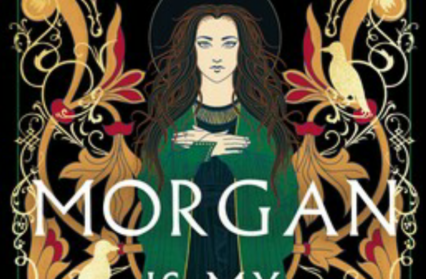Victoria Shirley delves into a feminist retelling of Arthurian legend, in Sophie Keetch’s debut novel, Morgan is My Name.
‘I don’t care about kings, sorcerers, the plots they weave. I am only seeking my own future.’
Morgan is My Name is the debut novel by Sophie Keetch, an author from South Wales. This feminist retelling of the Arthurian legend, which is told from the perspective of Morgan le Fay, is the first instalment of a new trilogy. The first book begins with Morgan’s childhood, and covers her love affair with Accolon of Gaul, her education in a nunnery, her marriage to Urien of Gore, the ascension of Arthur, and the birth of her son, Yvain. Writing the novel in the first person, Keetch gives Morgan a strong sense of voice and purpose, which are absent in the medieval sources. Morgan’s story has been retold before, most notably by Marion Zimmer Bradley in The Mists of Avalon (1983), presenting Morgan as a pagan priestess who opposes the rise of Christianity in Britain. Keetch’s Morgan is a defiant, headstrong, wilful, and determined. Her retelling focuses on Morgan’s familial relationships, her pursuit of knowledge, and her desire to control her own story.

Keetch begins Morgan is My Name with Morgan’s childhood. Morgan is the daughter of Gorlois, Duke of Cornwall, and his wife, Igraine; she also has two sisters, Morgause and Elaine. Morgan’s childhood is disrupted by the death of her father and her mother’s second marriage to Uther, King of Britain. Morgan persistently defies the will of her stepfather, but Igraine tells her daughter: ‘Submit to him Morgan, for your own good. It is the only way to survive’ (p. 36 ). Keetch presents Igraine as a pragmatic and politically savvy woman who marries Uther to ensure her own survival and that of her children. During her childhood, Morgan is witness to several important events, including Arthur’s conception when Uther visits Igraine disguised as Gorlois – this a key episode in the Arthurian tradition, originally invented by Geoffrey of Monmouth in his History of the Kings of Britain (c. 1138), and later revised by medieval French and English writers. Morgan also hears the cries of Arthur after his birth as Merlin and Ninianne take him from Tintagel to the household of Sir Ector. Using Morgan as a child witness is a skilful way of incorporating these important events into the novel, and Keetch revisits these episodes later when Arthur ascends to the throne.
Morgan’s youth are dominated by study and romance. On her eighth birthday, Morgan insists that she ‘wish[es] to learn everything’ (p. 44), and Igraine persuades Uther to let Morgan work at the chapel, where she is educated by Father Felix. After the marriage of her sister, Elaine, Morgan is not allowed to venture outside alone. To continue her learning, she is accompanied to chapel by Accolon of Gaul, and the two of them fall in love while playing chess. However, when Morgan is seen in public with Accolon, Uther decides to send her to a nunnery to learn ‘all [the] qualities a lady must have to be worth her upkeep’ (p. 87). Once Morgan arrives at St Brigid’s, she learns that her mother has instructed the Prioress to educate her daughter in the Severn Arts. At St Brigid’s, Morgan soon advances to the art of healing, but she also studies necromancy in secret, claiming ‘Knowledge cannot be bad, only misused’ (p. 120). When plague breaks out at the nunnery, Morgan uses her skills to heal the sisters and her friend, Alys of Llancarfan. Morgan’s interest in necromancy distinguishes her from the nuns at St Brigid’s, but the contrast between magic and Christianity – which are usually opposed within the Arthurian tradition – is not fully drawn out in the novel.
Once she turns nineteen, Morgan is recalled from St Brigid’s to Tintagel. Before the arrival of the royal court, Morgan finally acts on her desire, and secretly spends the night with Accolon. Keetch’s prose conveys the passion and longing of both Morgan and her lover:
We were water then, fluent, indivisible; a lake in a rainstorm, rippling with life; a waterfall colliding with itself in tumult and thrill; a river in spring thaw, wild and unceasing, rushing to meet the salt embrace of the sea. (p. 165)
Yet Morgan and Accolon’s love affair is short-lived. Once Uther arrives at Tintagel, he publicly announces that Morgan is to be married to Urien of Gore. She initially refuses the betrothal and claims that she ‘won’t marry any king’ (p. 176) because she loves another man and has given herself to him. Following the announcement, Accolon flees to Ireland, and Morgan cedes to Uther’s demands, and marries Urien. Their marriage is an unhappy one: Morgan cannot conceive a child, and she continues healing in secret despite her husband’s protestations that such work is not suitable for a queen.
After the death of Uther, Arthur is proclaimed king as he successfully manages to draw the sword from the stone – a task that only the High King of All Britain can accomplish. Arthur’s lineage is unknown, but before the coronation, Merlin reveals that Uther and Igraine are Arthur’s biological parents. Morgan describes the moment Igraine learns of her son’s existence in vivid detail:
“in the silence of the Great Hall, she let out a long, anguished howl, a sound so terrible I had never heard its like; the cry of a wounded soul, gutter by lies and loss, broken by the ultimate betrayal”.
Igraine’s howl expresses more than words – a mother deprived of her son. As Morgan meets her brother for the first time, she notices the similarities between her mother and Arthur: “Arthur’s fury was hers, as was his blood; as they were mine, as they were ours”. Later, Igraine tells Morgan how she agreed to give up Arthur, providing Ninianne promised she would not bear Uther another child. By giving Igraine a voice, Keetch rewrites the birth of Arthur as an act of female resistance against patriarchal authority.
The last few chapters of Morgan is My Name focus on the deteriorating relationship between Morgan and Urien. After years of marriage, Morgan eventually gives birth to a son, Yvain, but she soon hears that Urien has fathered a child with another woman, who has also been named Yvain. Morgan confronts Urien, using her power against him to ensure her liberation. Morgan leaves Gore with Yvain, and heads for Camelot, where she is welcomed by Arthur. The ending marks a new phase in Morgan’s life and sets up the second installation of the trilogy. Keetch’s retelling is ambitious, but it still much ground to cover, and Morgan’s future is yet to be revealed.
Morgan is My Name is available to pre-order now, ahead of its release in June.
Sophie Keetch Sophie Keetch











